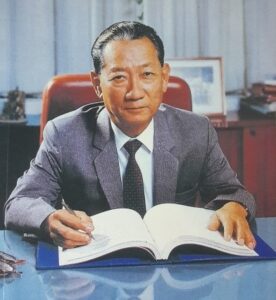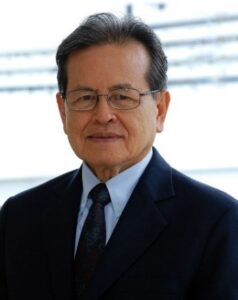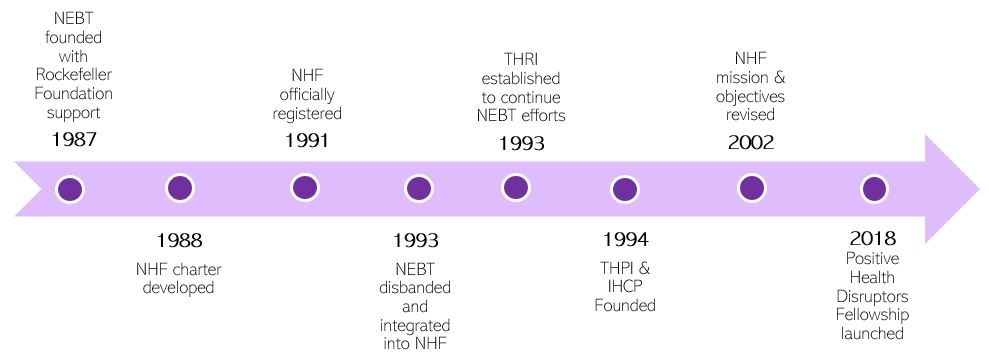

Dr. Pairoj Ningsanon and Dr. Prawase Wasi, two of the original founders of the Thailand National Health Foundation
NHF History
Establishing the Foundation
Starting in 1987, a small group of nationally recognized doctors and leading health scholars first brainstormed the idea for the Thailand National Health Foundation.
The Foundation’s Early Years
NHF’s early activities focused on convening stakeholders, organizing conferences, and conducting collaborative research on a range of public health topics.
The Era of Integration
In the mid-1990s, NHF took on a greater knowledge creation and management role and founded a number of nationally-relevant health institutes.
Current Work
NHF continues to create, manage, and apply public health knowledge across diverse stakeholder groups in order to support health system improvements on a range of critical public health issues.

Summary Message from The President Professor Dr. Prawase Wasi
The National Health Foundation (NHF) was founded in response to the foreseen circumstance in the past. That was 30 years ago when Dr. Scott B. Halstead, the deputy head of Department of Health Science and the representative of the Rockefeller Foundation in Thailand funded the Ministry of Public Health to establish an advisory body, which was The National Epidemiology Board of Thailand (NEBT). At that time there was a discussion among the Thais on how should the newly established body be managed; should it be under the Thai bureaucracy or should it be an independent agency. While the Rockefeller Foundation wanted this advisory body to be a part of MOPH, the Thais saw the coming uncertainties and decided to establish NHF as an alternative. This decision was then approved by the Minister and the Permanent-Secretary of the MOPH, and Dr. Pairoj Ningsanon became its first president, while Dr. Sanguan Nittayarumphong became its first secretary-general.
However, as time goes by, the work of NEBT became increasingly impeded by politics, before it was finally disbanded by a minister, as foreseen. Since then the works of NEBT were transferred to NHF, along with Dr. Chanpen Chooprapawan, the secretary of the National Epidemiology Commission, who started working with NHF and had an important role in the transformation of health organizations in Thailand. Thai health sector is one of the most abundant in players than other sectors with the participation of many independent and semi-independent organizations, such as the Health System Research Institute (HSRI), the Thai Health Promotion Foundation, and the Social Security Office, the National Health Foundation (NHF). These organizations form a network, which work beyond their academic and institutional boundaries, and put them in position in which they were able to push forward and support health of the Thai people. This is a big challenge, therefore the ability to manage the organization, the knowledge, and oneself is very important, as in every other aspect of life.
The transformative role of NHF continued as both Dr. Paibul Suriyawongpaisal, former secretary general of NHF, and Dr. Somsak Chunharas, former secretary general and the current president of NHF, take the foundation toward the knowledge creation and management role. This was evident when the Thailand Research Fund (TRF) asked NHF to support and manage research programs relating to health issues that are under the TRF supervision.
Dr. Somsak Chunharas, who was also the first president of Health System Research Institute (HSRI), is highly experienced in research management, and earned respect from the prominent figures in the field of health research, some of which are Dr. Ari Wanlayasevee, Dr. Jarad Suwanwelaa, Dr. Tada Yipintsoi, and Dr. Vicharn Panich. These figures contribute to one of the outstanding quality of NHF. It is said that each person or each organization have their own unique strength and status, and they should work corresponding to these qualities. Some suggest that NHF should work on challenges that nobody else could achieve, that are to bridge and coordinate the works between various institutions, and take up difficult tasks that are of great importance to the country. In this time, when Thailand needs to maintain its balance to withstand the wave of changes and uncertainties from outside and within, Thai people need to realize that opinions alone cannot solve this country’s problem. What we need is the knowledge and the management to ensure that knowledge created is relevant to current problems, applicable, and well used. This knowledge also needs to be well assessed and modify according to changes in order to create practical solution to the problems. This mission requires individuals and organizations that can work the knowledge together and create social network like interconnected brain cells or a sky filled with stars. In this the NHF is just one small flame of a candle, but it is the responsibility of Thai people as a whole to light the flames and concentrate them all together to create a laser beam of knowledge, energizing Thailand to maintain its balance through the crisis. I wish you all best of health, longevity, and happiness and I wish you all the strength to create everything good for our country.
Establishing the Foundation
In 1987, Dr. Pairoj Ningsanon, then permanent-secretary of the Ministry of Public Health (MOPH), Dr. Prawase Wasi, and a group of doctors and health scholars agreed that Thailand needed an independent organization to act as a think-tank focused on policy analysis and development for the improvement of the Thailand public health system.
In 1988, the founders of NHF met to draw up a charter for the Foundation, which stated that NHF would be an independent organization separate from the Thai bureaucracy in order to retain autonomy from political influence. This request was submitted to the National Culture Commission (NCC) for approval and then to the Bangkok Metropolitan Administration (BMA) for registration. After three years of legal processes, NHF was formally established as a foundation under Thai Civil and Commercial Code on October 28th, 1991. Dr. Pairoj Ningsanon became NHF’s first President and Dr. Sanguan Nittayarumphong became its first Secretary-General.
The Foundation’s Early Years
NHF’s activities from the year of its foundation until 1993 focused primarily on convening stakeholders, organizing conferences—including convening the first Thailand National Health Assembly—and conducting collaborative research on a range of public health topics with other closely aligned organizations, including annual meetings of the National Epidemiology Board of Thailand (NEBT), whose overarching mission was to oversee epidemiological public health efforts across the country.
“We participated in activities that aimed to create policy change, especially concerning NEBT’s activities, such as on the issue of ‘brain drain’, or whether or not we should have a vaccine for Hepatitis B because at that time the Hepatitis B vaccine was not part of the national compulsory vaccination program, or even on controlling the spread of dengue which we were joining with other parties to brainstorm…”
- Excerpt translated from an interview with Dr. Sanguan Nittayarumphong, NHF’s first Secretary-General
The Era of Integration
In 1993, NHF’s close partner organization, NEBT, was disbanded. As a result, its staff, strategic plans, and budget were transferred and integrated into NHF. During this time period, NHF took on a greater knowledge creation and management role. From these principles, NHF founded and supervised the work of the Thailand Health Research Institute (THRI), which was created to continue the mission of NEBT.
Almost one year later, NHF founded another two institutes: the Thailand Health Promotion Institute (THPI), whose mission is to inspire and coordinate individuals and organizations in all sectors to enhance health promotion efforts in support of a healthy Thailand, and the Institute of Health and Consumer Protection (IHCP).
In 2002, the NHF mission and strategic objectives were revised by the Board of Trustees and NHF senior leadership to better enable NHF to work more for the benefit of the public.
Current Work
NHF continues to be committed to its original mission, as an independent Foundation supporting the creation, management, and application of public health knowledge in order to support effective decision-making, planning and implementation leading to health systems improvements in key priority health areas.
Currently, the Foundation focuses its efforts on the following strategic issues:
- Non-Communicable Diseases (NCDs)
- Youth Health and Gambling Addiction
- Road Safety
- Active Ageing
- Medical Cannabis Use
- Positive Health Disruptor Fellowship program
- International Decision Support Initiative (iDSI)
